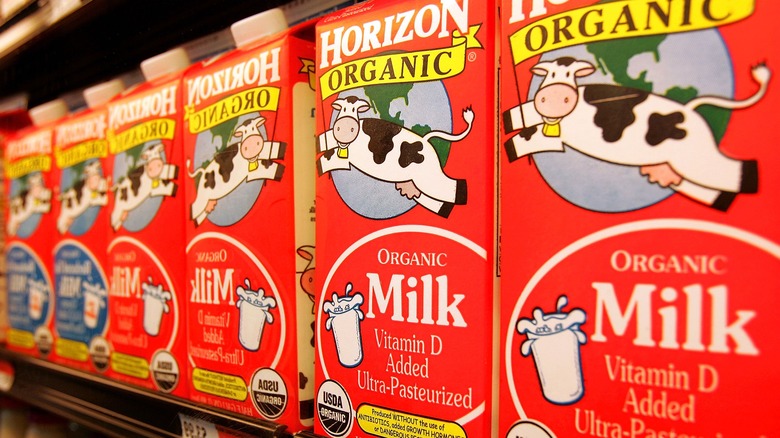Why Do Regular And Organic Milk Taste Different?
Consumers buy their preferred type of milk for a number of reasons, including for their health, flavor, price, and availability. Before a wider variety of milk alternatives was available, most people were simply deciding if they wanted full or nonfat. But in the 90s, another player entered the competition — organic milk and now consumers find themselves with yet another flavor profile to consider (via MoSpace).
Conventional dairy milk comes from cows that are often treated with growth hormones and antibiotics, while organic milk must come from cows that follow stricter rules about what they eat and how they graze compared to organically raised cows. Organic milk on the other hand has many more regulations surrounding it. Organic milk cannot be treated with any growth hormones or antibiotics, their feed also has to be organic, and they must be led to graze in a pasture, according to the Dairy Alliance.
One of the prime differences between organic milk and dairy milk is how they are pasteurized. It's also the reason that organic and regular milk taste slightly different.
Organic milk is heated to a higher temperature
Pasteurization is the process by which milk is heated to a temperature high enough to kill bacteria and any dangerous organisms according to The Kitchn. The outlet explains, regular milk is heated to 165 degrees for 15 seconds known as HTST or high-temperature short time. This extends milk's shelf life to two weeks. On the other hand, Dairy Alliance explains that organic milk is pasteurized to 280 degrees for only two seconds. This ultra-pasteurization gives organic milk a longer shelf life than regular milk.
This key difference is also what causes these types of milk to taste differently. The high heat in the ultra pasteurization of organic milk causes the sugars to crystallize and proteins to denature writes Up Thirst. The cooked sugars can be tasted in organic milk and give it a tan color, according to The Kitchn.
Huffington Post did a blind taste test among 23 of their editors. The response varied with some saying that the regular milk tasted "watery" to an option that they both tasted "rich." Fifty-three percent of the taste testers were able to tell the difference between the organic milk and the regular.
Ultimately, taste is subjective and a matter of personal preference, but if you're trying to decide between regular and organic milk in the grocery aisle, you should know they're separated by more than just marketing.

